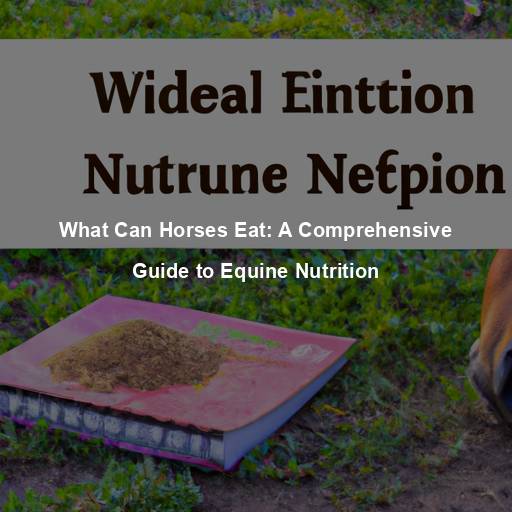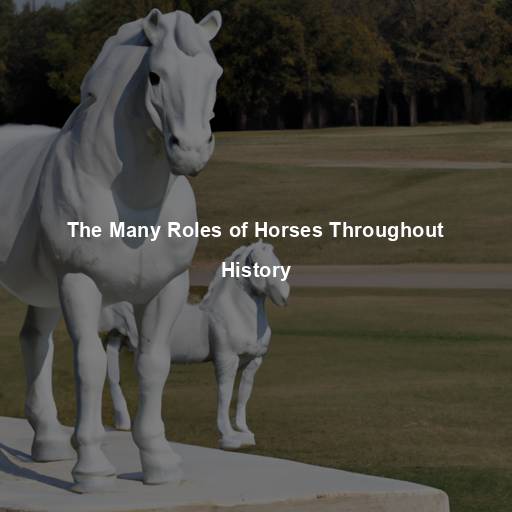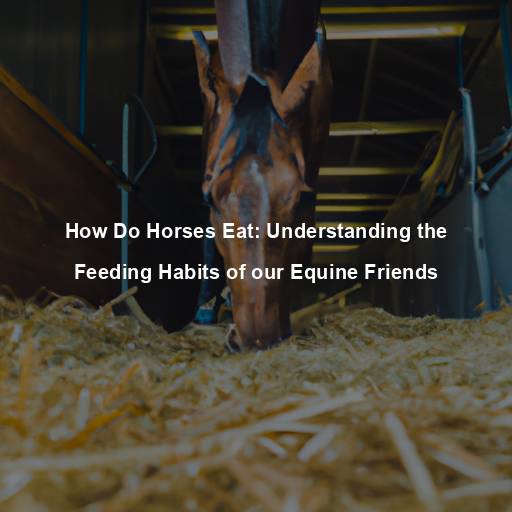What Can Horses Eat: A Comprehensive Guide to Equine Nutrition
Last Updated on October 20, 2023 by Evan
Contents
- 1 Understanding the Unique Digestive System of Horses
- 2 Understanding Dietary Restrictions and Considerations
- 3 Maintaining a Healthy Weight and Body Condition
- 4 Special Considerations for Senior Horses
- 5 Hydration: The Key to Equine Health
- 6 FAQs: What Can Horses Eat
- 6.1 Can horses eat grass?
- 6.2 What other types of forage can horses eat?
- 6.3 Can horses eat fruits and vegetables?
- 6.4 Can horses eat grains and concentrates?
- 6.5 What should horses avoid eating?
- 6.6 Can horses eat supplements?
- 6.7 How should a horse’s diet be balanced?
- 6.8 Should horses have access to water at all times?
Understanding the Unique Digestive System of Horses
Horses are magnificent creatures, captivating us with their beauty, grace, and strength. As responsible horse owners, it is our duty to ensure their well-being, and a crucial aspect of their care is proper nutrition. Understanding the unique digestive system of horses is essential in determining what they can and should eat.
The Equine Digestive System: A Complex Journey
Horses, with their intricate digestive system catered specifically for plant consumption, have a fascinating anatomical quirk: the inability to regurgitate, unlike us humans. This peculiarity, however, presents them with potential digestive conundrums when exposed to an improper diet. Therefore, it becomes our paramount responsibility to meticulously contemplate their innate feeding habits and intricate digestive needs, ensuring they receive the nutrition they require to thrive.
Forage: The Foundation of a Horse’s Diet
In the vast realm of equine nutrition, one cannot overlook the profound significance of forage! Picture this: majestic horses, with their innate grazing tendencies, relying on the bountiful offerings of hay or pasture grass. This fibrous feast is not merely a source of essential nutrients but also a vital component in maintaining the harmonious equilibrium of their intricate digestive mechanisms. Let us venture into the captivating world of horse nutrition, where the enigmatic role of forage leaves us marveling at its role in sustaining these magnificent creatures.
High-Quality Hay: A Staple Food
High-quality hay should be the primary component of a horse’s diet. It serves as a source of long-stem fiber, which is crucial for maintaining healthy digestion and preventing issues like colic. Good-quality hay should be free from dust, mold, and weeds, and it should be stored properly to retain its nutritional value.
Nutrient-Rich Pasture: A Natural Buffet
When horses roam through lush green pastures, it’s like witnessing nature in its purest form. They can happily munch on grass, channeling their inner foragers while absorbing the nutrients they need to thrive. Nevertheless, we mustn’t overlook the importance of responsible pasture management, lest our equine friends overdose on the green goodness or accidentally snack on dangerous plants. Employing a rotational grazing system and consistently maintaining the pastures will go a long way in creating a harmonious and healthy grazing experience for our majestic companions.
Concentrates: Supplementing the Diet
When it comes to feeding our beloved horses, there’s no denying that forage is crucial. However, there are times when a little extra support is needed to meet their nutritional requirements. Enter concentrates! These magical supplements, available in various forms like grains, pellets, and extruded feeds, are designed to bridge the nutrient gap.
Understanding the Nutritional Content
When it comes to choosing concentrates for horses, it’s important to have a thorough grasp of their nutritional value. Each concentrate comes with its unique blend of proteins, carbs, fats, vitamins, and minerals, making the selection process quite perplexing. Seeking guidance from an equine nutritionist or veterinarian is essential to ensure that the chosen concentrate aligns with the specific dietary requirements of an individual horse.
Feeding Concentrates Safely
When it comes to incorporating concentrates into a horse’s diet, proceeding with caution is key to avoid any tummy troubles. Slowly introducing these delicacies allows the horse’s digestive system to adjust and prevent any unwanted surprises. Moreover, breaking down these concentrate meals into smaller, more digestible portions throughout the day can provide a smoother culinary experience for our equine friends. And let’s not forget the importance of keeping their water game strong – clean and refreshing hydration is paramount for aiding in digestion and overall well-being.
Understanding Dietary Restrictions and Considerations
When it comes to horses and their nutritional needs, it’s essential to tread carefully and navigate the labyrinth of dietary requirements. While these majestic creatures have their own set of dietary restrictions that demand attention, it’s equally important to be cognizant of the potential pitfalls lurking within their culinary choices. The equine world is rife with a plethora of foods that can prove perilous and downright toxic, making it imperative for horse owners and enthusiasts to steer clear of these culinary landmines and prioritize their beloved animals’ overall health and happiness.
Toxic Plants and Substances
Horses should never have access to toxic plants, as ingestion can lead to severe health issues, or even be fatal. Some common plants toxic to horses include ragwort, yew, and oleander. Additionally, substances like chocolate, caffeine, and alcohol should never be given to horses, as their bodies cannot metabolize them safely.
Safe Treats and Snacks
While it’s tempting to treat our equine companions with goodies, it’s important to choose safe options. Apples, carrots, and commercial horse treats are generally safe choices. However, avoid sugary or processed snacks, as they can contribute to weight gain and dental issues.
Dietary Considerations for Special Cases
When it comes to our equine friends, there are some unique situations that call for extra attention to their dietary needs. Whether we’re talking about expectant mares or those nurturing their young, or even horses dealing with specific health conditions, it’s crucial to acknowledge their distinct requirements. To ensure that these individuals receive the right balance of nutrients, it’s always wise to reach out to an equine nutritionist or veterinarian who can offer expert guidance. They’ll help tailor a diet that suits their specific needs, leaving us feeling reassured and our horses feeling their absolute best.
Maintaining a Healthy Weight and Body Condition
Finding the perfect balance for our equine companions can be a puzzling endeavor, as their weight and body condition dance on the tightrope of their well-being. The key lies in unraveling the intricate tapestry of proper nutrition, delicately woven into their daily lives. Nourishing their bodies with the right fuel is the elusive secret to unlocking the door to their healthy weight, an enigma we must endeavor to solve.
Body Condition Scoring
It is of utmost importance for horse owners to consistently evaluate their equine companions using the well-regarded Body Condition Scoring (BCS) system. This invaluable tool enables vigilant assessment of the horse’s adipose distribution and muscular growth, preventing the perilous extremes of being underweight or overweight. By fine-tuning the equine diet with precision based on these evaluations, the goal of attaining and maintaining the optimum body condition becomes a reality.
Balancing Calories and Exercise
For horses struggling with weight issues, balancing calorie intake and exercise is key. Decreasing the calorie content of concentrates, increasing forage intake, and providing regular exercise can aid in weight loss. Conversely, horses needing to gain weight may require increased concentrate portions and reduced exercise intensity.
Monitoring Intake and Using Slow Feeders
Keeping an eye on a horse’s munching habits is crucial, especially for those with a knack for overindulging or following a strict diet plan. Enter the slow feeders: ingenious contraptions like hay nets or hay balls that put the brakes on forage gobbling, curbing the need for lightning-fast consumption and encouraging a more leisurely grazing experience. These nifty devices not only assist in managing intake but also emulate the delightful rhythm of a horse’s natural grazing tendencies.
Understanding the Role of Supplements
Dietary supplements can serve various purposes, such as supporting joint health, promoting a shiny coat, enhancing hoof quality, or boosting the immune system. They are available in various forms, including powders, pellets, liquids, and pastes. However, not all supplements are created equal, and their effectiveness may vary.
Consultation with Equine Professionals
When it comes to adding supplements to your trusty steed’s diet, it’s crucial to seek the wisdom of equine experts in the field. These seasoned professionals, like spirited veterinarians and equine nutritionists, have the knowledge to evaluate your horse’s unique needs and advise on scientifically-backed recommendations for the perfect supplement cocktail. Don’t leave your hoofed companion’s health to chance – let the experts guide you on this perplexing journey.
Quality and Safety Considerations
Choosing the right supplements for your beloved horse can feel like navigating through a labyrinth of options. Amidst this perplexity, it is imperative to cut through the chaos and prioritize two key factors: quality and safety. Opt for trustworthy brands that diligently follow industry standards, undergo rigorous testing to guarantee purity and effectiveness. Furthermore, keep in mind the age, health condition, and desired purpose of your equine companion when selecting the perfect supplement to meet their unique needs.
Potential Risks and Interactions
Supplements, oh supplements, their allure can be tempting, but let us not forget the hidden thorns in this enchanted garden of wellness. In the realm of interactions, some supplements may dance a treacherous tango with our medications, leading to unforeseen consequences. And alas, the art of excess, for even the most innocent remedy can turn sour if consumed in abundance. Fear not, dear reader, for there is wisdom in the dosage instructions bestowed upon us by the makers of these elixirs; but, when in doubt, seek guidance from those in the know, the guardians of our well-being.
Special Considerations for Senior Horses
As horses age, their nutritional needs may change, requiring special considerations to support their health and well-being.
Dental Health and Forage Alternatives
As our equine companions age gracefully, their dental woes might saddle them with a perplexing predicament – munching on long-stem forage becomes a challenging task. Fear not, dear horse lovers, for there are alternative forage options that can come to their rescue! Enter stage left – chopped hay and soaked hay cubes, touted as the saviors that harmonize fiber intake and preserve their precious health. A burst of relief, both for our seasoned steeds and the peace of mind that accompanies their well-being.
Joint Support
As our beloved horses grow older, they sometimes face the frustrating challenges of joint stiffness and discomfort. Fortunately, there are joint supplements available in the market designed specifically to support their precious joints. These supplements, infused with powerful ingredients such as glucosamine, chondroitin, and hyaluronic acid, have shown promising results in improving joint health and enhancing mobility for senior horses. Nonetheless, it is vital to seek professional guidance from a trusted veterinarian before introducing any new supplement regimen, ensuring your horse receives the best possible care tailored to their unique needs.
Weight Management
As our equine companions age gracefully, their bodies may embark on a perplexing journey of fluctuating weights. Some may find themselves inching towards the heavier end of the scale, while others may experience the frustrating disappearing act of pounds. Fret not, dear equestrian enthusiasts, for there are ways to navigate this enigmatic maze of senior horse weight management. By attentively gauging their body condition score and curating a diet tailored to their unique needs, we can embark on a quest to maintain that elusive ideal weight.
Adequate Hydration
Ensuring senior horses have access to clean, fresh water is crucial to prevent dehydration, especially during hot weather or when they have dental issues that affect their ability to consume forage. Adding electrolytes to their water or feed can also help maintain hydration levels.
Common Allergens for Horses
Horses can be allergic to a variety of substances, including certain types of hay or bedding materials, insect bites, dust mites, pollen, or even specific ingredients in their feed or supplements. Common signs of allergies in horses include skin irritation, itching, hives, respiratory issues, or gastrointestinal disturbances.
Diagnostic Testing
When it comes to those pesky allergic reactions, figuring out the culprit can be quite the puzzle. Thankfully, diagnostic testing swoops in to save the day, helping to unravel the mysterious allergen. Whether it’s blood tests, skin patch tests, or intradermal tests, these investigative tools are like secret agents on a mission to uncover the truth. Once the sneaky allergen is exposed, a master plan can be devised to keep those pesky allergies at bay.
Allergen Avoidance and Environmental Modifications
The primary approach to managing allergies in horses is to minimize exposure to the allergen. This may involve changes in the horse’s environment, such as using alternative bedding materials, providing high-quality dust-free hay, or using fly sheets to protect against insect bites. Additionally, keeping the horse’s living area clean and well-ventilated can help reduce allergen levels.
Dietary Modifications
When it comes to managing allergies or sensitivities in horses, dietary adjustments may be required. This can mean removing certain ingredients or additives from their diet and finding appropriate substitutes. It is imperative to seek guidance from experts in equine nutrition or veterinarians to guarantee that the horse’s nutritional requirements are adequately fulfilled while effectively handling their allergies.
Hydration: The Key to Equine Health
Proper hydration is vital for the overall health and well-being of horses. Dehydration can have serious consequences and affect various bodily functions. It is important to ensure horses have access to clean, fresh water at all times.
Water Consumption and Requirements
Water consumption is a truly fascinating aspect of a horse’s life, as it fluctuates in perplexing ways due to a multitude of factors. Isn’t it mesmerizing to think that these majestic creatures, with their varying sizes, activity levels, and surroundings, have such diverse thirsts? On a general note, horses typically seek 5-15 gallons of water every day, but when the heat cranks up or they engage in rigorous exertion, their thirst intensifies and their hydration needs surge in unexpected bursts.
Importance of Water Quality
Ensuring that horses have access to a sufficient quantity of water is just half the equation. The quality of water they consume is equally vital. It is imperative to maintain an environment free from any contaminants that pose a threat to their well-being, such as unwelcome bacteria, troublesome algae, or an excessive presence of minerals. By diligently cleaning water troughs or buckets and consistently offering them fresh, uncontaminated water, we can guarantee our majestic equine companions stay optimally hydrated, fostering their overall health and vitality.
Encouraging Water Intake
Some horses may be reluctant to drink water, especially when away from their familiar environment. To encourage water intake, strategies such as flavoring the water with a small amount of apple juice or placing a familiar object, like a small ball or toy, in the water can help entice them to drink.
Electrolyte Supplementation
In the midst of vigorous workouts, scorching temperatures, or even health setbacks, horses go through a perplexing phase where they shed electrolytes due to sweat or heightened urination. Reviving their electrolyte levels through supplementation becomes crucial to restore these vital minerals and uphold optimal hydration. However, avoiding the treacherous path of over-supplementation is paramount, necessitating careful adherence to manufacturer guidelines and seeking advice from knowledgeable professionals.
FAQs: What Can Horses Eat
Can horses eat grass?
It’s a common curiosity among horse enthusiasts: can horses munch on grass? The answer is a resounding yes! Grass serves as a vital component of their diet, packed with nutrients, fiber, and hydration to keep these majestic creatures thriving. Of course, as with anything in life, there are a few considerations to bear in mind. Ensuring that the grass is free from harmful substances like pesticides or chemicals, and steering clear of toxic plants in pasture areas keeps our equine friends healthy and content. So, let the grazing commence, and let our beloved horses relish in nature’s bounty!
What other types of forage can horses eat?
Did you know that horses have a surprisingly diverse palate when it comes to their forage options? Apart from the usual grass, these majestic creatures can also savor a range of delicious alternatives. Take hay, for example – a delightful concoction of dried grass or legumes like alfalfa or clover. This fantastic forage is typically dished out to horses when their access to fresh pasture is limited or during colder months when nature’s bounty takes a winter slumber. And hey, let’s not forget about the unique flavors of silage, a fermented grass delight, and chaff, the finely chopped forage that adds a scrumptious twist to their mealtime repertoire. So, if you ever find yourself wondering what else tickles a horse’s taste buds, remember that these burstingly diverse forage options keep their diets far from monotonous or perplexing.
Can horses eat fruits and vegetables?
Yes, horses can eat certain fruits and vegetables as a treat or supplement to their main diet. However, it is important to be cautious and only feed them in moderation. Some safe options include apples, carrots, and watermelon, which horses tend to enjoy. Avoid feeding fruits and vegetables that are overly sweet or contain seeds, as they could potentially cause digestive issues.
Can horses eat grains and concentrates?
Yes, horses can eat grains and concentrates, but these should be given in controlled amounts and as part of a balanced diet. Grains such as oats, barley, and corn can be fed to horses, but it is important to consider the specific nutritional needs and activity level of each horse. Feeding excessive amounts of grains or concentrates can lead to digestive problems and other health issues.
What should horses avoid eating?
Horses should avoid eating certain toxic plants and substances that can be harmful to their health. Some common plants that are toxic to horses include ragwort, yew, and foxglove. Additionally, horses should not consume foods that are toxic to other animals, such as chocolate, caffeine, onions, and garlic. It is crucial to be aware of potential hazards and ensure the horse’s environment is free from toxic plants or substances.
Can horses eat supplements?
Yes, horses can consume supplements, but it is recommended to consult with a veterinarian or equine nutritionist before introducing any supplements. This is to ensure that the supplements are appropriate for the horse’s specific needs and do not interfere with their overall diet. Proper consideration of the horse’s age, health, and activity level is essential before introducing any supplements into their feeding regimen.
How should a horse’s diet be balanced?
When it comes to nourishing our equine friends, maintaining a well-rounded and tailored diet is key. A harmonious blend of nutrient-rich forage, such as grass or hay, takes center stage, complemented by measured portions of grains or concentrates if deemed beneficial. The delicate balance of forage to concentrate hinges upon the horse’s unique combination of age, weight, and activity level, necessitating the wise counsel of an equine nutritionist to ensure a bespoke meal plan in line with their individual needs.
Should horses have access to water at all times?
Ensuring horses have a constant supply of fresh, untainted water is absolutely vital. This liquid elixir is key to their well-being, aiding digestion, hydration, and overall vitality. These majestic creatures can gulp down an impressive amount of water daily, particularly during scorching temperatures or post-exertion. It’s paramount to regularly inspect the water sources, safeguarding against any unwelcome contaminants that may discourage our equine friends from quenching their thirst.







